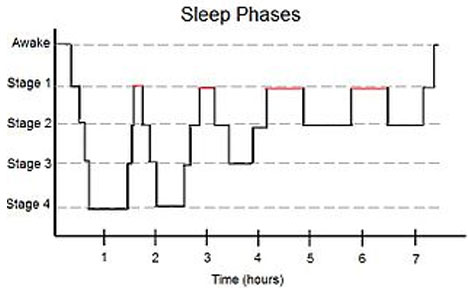Sleep cycles, REM indicated in red.
Sleep progresses in a cyclical fashion through five stages. Four of these stages are collectively referred to asnon-rapid eye movement (NREM) sleep whereas the last cycle is a rapid eye movement period. A cycle takes approximately 90-110 minutes to complete. Wakefulness is found through EEG measures to be characterized bybeta waves which are the highest in frequency and lowest in amplitude and tend to move inconsistently due to the vast amount of stimuli a person encounters while awake.
 Want to Improve Your Sleep Cycles? … NeuroFeedback has an APP for that…
Want to Improve Your Sleep Cycles? … NeuroFeedback has an APP for that…
Call or Text us for an Introductory NeuroFeedback Session in Our Kitsilano, Vancouver, BC Location – and Eliminate Your Anxiety This Year.
Call or Text: 604-785-1709
BOOK ONLINE: www.no-stress-success.com
- Pre-sleep is the period of decreased perceptual awareness where brain activity is characterized by alpha waves which are more rhythmic, higher in amplitude and lower in frequency compared to beta waves.
- Stage one is characterized by light sleep and lasts roughly 10 minutes. Brain waves gradually transition totheta waves.
- Stage two also contains theta waves, however random short bursts of increased frequency called sleep spindles are a defining characteristic of this stage.
- Stage three and four are very similar and together are considered to be “deep sleep”. In these stages brain activity transitions to delta waves which are the lowest in frequency and highest in amplitude. These two stages combined are also called slow wave sleep (SWS).
- Stage five, REM sleep, is one of the most interesting stages as brain wave patterns are similar to those seen in relaxed wakefulness. This is referred to as “active sleep” and is the period when most dreaming occurs. REM sleep is also thought to play a role in the cognitive development of infants and children as they spend much more of their sleep in REM periods opposed to adults.
During the first half of the night, the largest portion of sleep is spent as SWS, but as the night progresses SWS stages decrease in length while REM stages increase.

